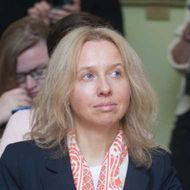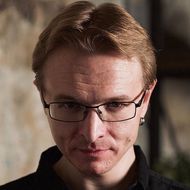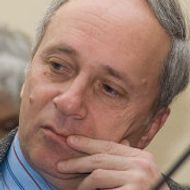В сентябре-декабре 2013 г. на факультете истории в качестве приглашенного профессора преподавала профессор Калифорнийского технологического университета в Помоне Элис Кимерлинг Виртшафтер (Elise Kimerling Wirtschafter). Профессор Виртшафтер — известный специалист по социальной истории России XVIII – XIX вв., автор шести монографий (“Structures of Society: Imperial Russia’s ‘People of Various Ranks”, “The Play of Ideas in Russian Enlightenment Theater”, “Religion and Enlightenment in Catherinian Russia” и др.) и ряда статей. Одна из ее книг - «Социальные структуры: разночинцы в Российской империи» - переведена на русский язык.
1. Уважаемая профессор Виртшафтер, расскажите немного о вашей семье. Были ли в вашей семье свои традиции и ценности? Как они повлияли на ваше мировоззрение?
I come from a very close family and community in Birmingham, Alabama. I grew up during the era of the civil rights movement and the Vietnam War, when Americans were becoming increasingly critical of their institutions, society, and history. To this day I think and read about the legacy of slavery and Jim Crow, and about the condition of African Americans in the U.S. The civil rights era was a time of peaceful revolution, and the historical importance of that time is something that has informed my life and thinking. I also come from a conservative religious family, where the traditions of Judaism were observed and taken very seriously, but also questioned and reformed. This explains my interest in the Russian religious Enlightenment. Finally, I come from a family that found freedom and opportunity in America (hence my interest in social history and questions of social mobility): my grandparents were poor but my paternal grandfather went «from rags to riches.» He went to work straight out of high school, picking up pieces of scrap metal in garbage dumps. During WW II the scrap metal business became lucrative, and he died a wealthy man. He also was self-educated, and his three children are college educated: he read a lot of Jewish sources and studies, but I also remember him reading Spinoza and Montaigne. Both of my parents are college graduates, though my mother had to work her way through college because her father had died when she was 6, and her family did not have money to pay tuition. When I was in high school she went back to school and earned a Master's degree in sociology. I grew up in a culturally rich and intellectually stimulating household: my parents read poetry, literature, and history; discussed politics; engaged in community service; and raised four children. My dad owned a factory that produced medical and industrial gases, but I always remember him sitting in a big chair watching sports on TV and reading books, newspapers, and magazines. My mother loved to paint and read, and every Saturday afternoon my paternal grandmother listened to opera broadcast live from New York City. I have two sisters and one brother: all have advanced degrees (beyond the BA) and all speak foreign languages and engage in international work. In our family nothing was more important than education, including moral education, and family and community relationships. I describe my childhood as evreiskaia obshchina in Alabama, but also the origins of the Russian intelligentsia—because the surrounding society was relatively «backward.»
2. Чем Вы интересовались в школе и вне ее стен. Как вы выбирали свою будущую профессию?
In school, even in high school, I did not think much about what interested me intellectually. I was mainly interested in my friends and in having a good time. I was always a good student—this was expected in our home—but I did not read much on my own or engage in intellectual activities. Like all middle-class American kids, I did some sports (in my case, tennis, swimming, basketball, water skiing, and horseback riding) and went to summer camp; like all girls from the South, I took ballet and piano lessons; and like all Jewish children I went to religious school. Odnim slovom, I had a very ordinary childhood, one in which girls were supposed to be pretty, quiet, and able to play the piano.
I chose my profession by accident, when I went to college (to the university). I always had liked history because my dad liked history, and when our family took road trips, we often visited historical sites. I also had been to Europe and Israel, where the sense of history is much stronger than in the U.S. By accident I enrolled in a Russian history class, during the first semester of my studies (I actually thought that I wanted to be a veterinarian or a musicologist), and I fell in love with the subject matter. The second semester I took another class and made an A (the first semester I had received a B). Then over the summer I read War and Peace, and that was it. I have loved the study of Russian history ever since. In Russian history I have found answers to personal questions that grow out of my social origins and cultural heritage, which is American, Jewish, and Southern.
3. Расскажите вкратце о периоде обучения в университете. Как готовят историков в Штатах? Когда и почему вы решили заниматься русской историей? Кто повлиял на Ваш выбор и стал вашим учителем?
In the U.S. students do not have to choose a major field of study before the third year (though this is beginning to change and has never been the case in technical fields such as engineering). I started serious study of Russian history and language in my third year at the university. The first year I was in North Carolina (Chapel Hill) and the second year in Jerusalem (Hebrew University). But I graduated from Brandeis University, where I studied with Gregory Freeze, a well-known historian of the Russian church. Freeze prepared me for graduate school and for my career as a professional historian. After writing a senior thesis on the worker question in the Third Duma (and going to summer school twice to work on my Russian), I went to Columbia University for my Ph.D. There I studied with Marc Raeff, who always emphasized the importance of knowing European as well as Russian history, and who insisted that his students read Russian, German, and French. Otherwise, my education was much like yours: reading, doing research based on original sources, learning historiography, and trying to answer both concrete and bigger interpretive questions.
4. Как Вы оказались впервые в Москве? Стажировка у П.А. Зайончковского была для Вас целенаправленной? Какое впечатление он на Вас произвел? Чем запомнился?
My first starzhirovka in Moscow was under the auspices of the International Research and Exchanges Board and the Fulbright-Hays program: the only way to do research in the Soviet Union was to be accepted to the IREX program and then to be approved by the Soviet Ministry of Culture. The program was a official obmen: for every American who came to the USSR, a Soviet citizen went to the U.S. As a graduate student I lived in the big obshchezhitie at MGU. I'm not sure how I got Petr Andreevich as my rukovoditel': other Columbia students had worked with him, and Columbia had good relations with the archives. In general, because of these relationships, Columbia students had good luck getting access to archival materials. P.A. was highly respected in the U.S. Russian historians read his books and relied on his knowledge of archives. He struck me as a person who believed in nauka, and he helped foreigners to obtain archival materials, because he wanted as much research as possible to get done. Like most Soviet citizens (in their official relaitonships), he did not talk a lot about his past or his family history. As he put it, he could have perished many times. I learned a lot from him: I met with him once a week during my stay at MGU; he called the sotrudnitsa at TsGVIA every time we met to make sure that materials were going to be sent to me at TsGADA, where we worked in a special reading room (the current zal mikofil'mov) for foreign researchers from capitalist countries. P.A. also helped me with technical questions—e.g. how to define a statistical sample from lists of recruits—and I remember, and have quoted, how he described the Russian «autocracy». Despotism, he said, means that the ruler ignores the laws; autocracy means that the ruler must obey the laws but can change them at will (po vole). This is, I think, still a very accurate description of how the Imperial Russian monarchy worked.
5. Как часто Вы приезжаете в Россию? Если связь между вашими визитами и появлением новых книг? И вообще, как зарождается идея новой книги? Что этому предшествует?
I do not come to Russia as much as I should or would like. I have three chidren, and for about 19 years, while they were growing up, I did not visit Russia. But I was here for extended periods in the communist era (1980-81 and 1984, in the Yeltsin era (1993), and now again in 2013. (I also made brief trips in 2012 and 2013.) So I have «lived» in Russia during three distinct periods, which allows me to make comparisons and to see Russian life from different perspectives. My first three books were based on archival research that I did in the 1980s and early 1990s. My second three books were based on published sources, and now I have begun work on my seventh book, which also will have an archival component. As a foreigner, I see my role not so much in uncovering original archival information about Russian history, though I try to do that too, but more in interpreting Russian history and culture for an Anglophone audience. I leave it to Russian scholars, who can go to the archives on a regular basis and who have a better understanding of their history and language to discover new information and establish new realities. My job is more interpretive and synthetic than «scientific».
The ideas for my books come out of the process of reading and doing research: as I work on one topic I always find questions and subjects that I do not understand and want to explore. One thing leads to another in an ongoing «historical» process. I usually start with a broad area of interest expressed in a few vague questions. Then I start to read, look at sources, think—and eventually I have a moment of illumination (usually more than one) as a topic takes shape in my mind and imagination. Eventually, I have to settle on a corpus of sources and at that point the sources begin to define the questions and categories of analysis that become a book or an article. (Ongoing reading of historiography also leads to the formulation of questions and the definition of parameters.) Writing is my favorite activity, and I find that my books tend to write themselves, once I have something to say and enough documentation upon which to base it. I do not believe that historians overturn paradigms or find final answers. To me, as Marc Raeff taught, «interpretation always is tentative». I think of history more as an art form than as a science, and I relate to each book the way an artist relates to a painting. One I've done what I can do with a particular topic or particular documents, it's time to move on to something different. That's why I've written on a range of topics and tried a range of genres and methods.
6. Первые ваши книги посвящены социальным слоям населения российской империи. Затем фокус исследований переместился в духовную сферу. Чем это обусловлено? Прокомментируйте, пожалуйста, это мое наблюдение.
My shift to cutural history can be explained in two ways. One reason was practical: I wanted to be at home with my children, and social history requires continual archival research. So I needed to think about topics that could be done using printed sources. But there also are important intellectual reasons for the change/evolution: my interest in social history was really an interest in social consciousness or mentality. I always wanted to understand how people think and what they think they are doing. So after a while, it seemed to me that social history showed over and over again that life is hard. How many ways can a scholar say that life is hard? I wanted to deal with people who told me what they were thinking—people who produced sources that expressed their ideas. So I turned to plays and then to sermons, and now to diplomacy. I also wanted to work on aspirational topics where people develop ideas and imagine new possibilities. But social history remains the foundation of my work and thinking as a historian: without social history I would not possess the technical skills, critical apparatus, analytical acumen, or understanding of evidence that I now, I hope, bring to the study of cultural and intellectual history. Social history is arguably the best place to start and to hone your skills as an historian.
7. Какими вы видите дальнейшие перспективы изучения русистики в Штатах, ведь это направление потеряло политическую подпитку, поскольку исчезла установка изучения «потенциального врага»?
Support for Russian studies has indeed been affected by the end of the Cold War. Russia is now just another European or Eurasian country. The reduced interest in Russia is mainly, however, the result of a broader decline of interest in the humanities. Higher education in the U.S. is becoming more vocational, more technical/scientific, and less oriented toward the liberal arts. The idea that every student should receive a general education for two years before specializing is becoming a luxury that we can no longer afford. This is a shame, but it's the result of financial pressures, information technology, and the emergence of a truly global economy
8. Поделитесь. Пожалуйста, своими впечатлениями и пожеланиями от своего пребывания в Вышке в 2013 году.
Vyshka appears to me as an amazing experiment that is helping Russian scholars and students to break out of the Soviet system, to think in new ways, to experiment and be creative, and to develop global relationships. I hope that the experimentation continues and that Vyshkastudents will carry innovative ideas into Russian society. What these ideas will be, I do not know. But because modern Russian science, scholarship, and arts always have been at the forefront of new developments, I am sure that as long as Russians are encouraged to think and be creative, benefits will accrue. I hope that Vyshka can improve its administrative/bureaucratic mechanisms, so that students and scholars can spend more time being creative and less time dealing with administration. (This is also a problem in the U.S.) Personally, I hope that the high quality of Russian historical research that has become evident since the dismantling of the Soviet Union will continue and that the contacts between Russian and foreign scholars, also difficult and extremely limited during the Soviet period, will lead to further intellectual collaboration, better knowledge, and improved understanding of Russian history. There is so much to learn, and Vyshka can play a central role in supporting the process of learning. It's exciting to get to know students and professors who believe that are working and studying to create somehting new.
Примите мою благодарность за согласие дать интервью для факультета истории НИУ ВШЭ.
Интервью подготовил студент 2 курса факультета истории Булат Якубов.





